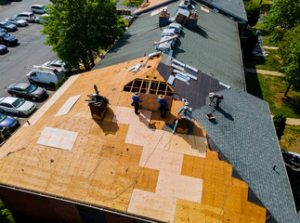
A roof is one of the largest investments you will make for your home. It protects your belongings and increases the resale value of your house.
A new roof prevents costly damage and saves on energy bills. However, a roof replacement can be more expensive than repairs. Visit Website for more information.
Cracked Shingles
Among the most visible warning signs that it’s time to replace your roof, cracking shingles are easy to see and often indicate deeper problems than just surface damage. These cracks can allow water into your home, leading to expensive repairs and structural damage.
Cracked shingles are a sign that the underlying shingle structure is failing. The shingles may also be brittle from age and weathering, which will only worsen with more exposure to extreme weather.
In some cases, the shingle cracks due to improper installation or a bad match of materials. These problems can cause moisture to leak into the shingles and underlayment, and then eventually rot, warp and even crack the wood framing of the roof.
The most common type of shingle crack is splitting. While cracking and splitting can sometimes be differentiated by the untrained eye, a split goes through the entire asphalt shingle rather than just the surface. This is a clear indicator that the roofing system is nearing its end of life and needs to be replaced.
Another sign of a failed shingle roof is blistering, which occurs when volatile gasses from the underside of the shingle rise through the adhesive strips and then erode the top of the shingle. There is no way to prevent blistering from occurring, and it’s usually a sign that the shingle roof will need to be replaced. In some cases, a new roof can be more cost-effective than repairs because it will replace the entire roof and allow you to choose more energy-efficient shingles. Additionally, a new roof will increase your home’s value and curb appeal and will be eligible for homeowners insurance discounts.
Leaks
When water leaks get out of control, it can do damage to your home and contents, including rotting joists, mold and mildew. Regular roof inspections are essential to catch problems when they’re small. Look for signs of leaking, such as water stains on ceilings or in the attic, damp rafters and sagging areas of the roof. If you notice these symptoms, it’s time to call in a professional for a detailed attic inspection and to determine if you need roof repair or full replacement.
A well-executed repair can stop leaks and prolong the life of your roof, especially if the repairs are done before the problem spreads. However, if your roofing system is nearing or past its expected lifespan or it’s been subject to repeated repair issues, replacing the roof may be the best long-term solution.
Roof replacement involves installing a new roofing system that includes shingles, underlayment and sometimes decking, depending on the extent of the damage. Many homeowners find that a roof replacement can lower their energy bills and protect their homes from weather-related damage for decades to come. A new roof can also add curb appeal, increase resale value and provide peace of mind.
The decision to repair or replace a roof can feel overwhelming, but it doesn’t have to be. By taking a close look at your roof, understanding the benefits of each option and knowing when to call in a professional, you can make a confident decision that protects your home and saves you money. And remember, your homeowners insurance can help pay for a repair or replacement, depending on the type of damage and the terms of your policy.
Damaged Flashing
Roof flashing is one of the most important parts of a roof, because it directs water safely away from vulnerable areas. It’s comprised of thin strips of metal installed around chimneys, skylights, vents, and roof valleys to seal and protect those joints. Without it, rainwater could sneak under shingles and seep into the roof deck. This could lead to leaks, mold, and structural damage.
However, storms and other elements can cause flashing to loosen, dent, or corrode over time. If this happens, it’s a good idea to schedule a repair as soon as possible to minimize the risk of long-term problems.
A roofing professional will carefully inspect the flashing, looking for cracks, gaps, and signs of deterioration. They’ll also check for rust, dirt, and moss. If the flashing is still intact, it can often be repaired with a roof sealant or caulk to close up any small holes. However, if the flashing has been damaged or is nearing the end of its lifespan, replacement may be a better option.
If you notice signs of roof problems, it’s wise to call a local roofer right away. A comprehensive inspection will reveal whether you need a simple repair or an entire roof replacement.
Remember, though, that if your roof is over 20 years old or shows significant shingle damage and bald spots with granule loss, it’s likely time for an entirely new roof. Replacing the whole roof will ensure that it lasts longer and provides a strong return on your investment. And since a new roof typically includes a warranty, it can offer more peace of mind than repairs alone. If you choose a repair, be sure to work with an experienced professional to ensure the job is done correctly.
Uneven Rooflines
Even roof lines are essential for structural integrity and proper water drainage. Uneven roofs can lead to leaks and long-term damage if left unaddressed. If a homeowner notices a noticeable dip or sag in the roofline, it’s important to have the area checked by a professional to determine if a repair or replacement is needed.
Visual inspections can help identify uneven rooflines, but it’s also a good idea to take a step back and view the home from the street or other angles. An experienced roofing professional can offer a more comprehensive evaluation that looks at the entire roof system to see how it is performing as a whole.
Many factors can cause an uneven roofline, including improper installation and foundation settling over time. However, sagging roofs are usually a sign of deeper issues like warped sheathing or rotted rafters that need immediate attention.
When a roof has significant structural damage, it’s often more cost-effective to replace it rather than repair individual areas. This provides an opportunity to upgrade to more energy-efficient materials and boost the resale value of the property.
A new roof can also improve ventilation to prevent moisture buildup that can affect the structural integrity of a building. A balanced ventilation system with soffit and ridge vents can keep the attic air flowing, preventing trapped humidity that leads to wood rot and warped roof materials.
Dark Spots in the Attic
A dark spot in the attic might be mold or mildew – but it could also be a sign that moisture is penetrating the roof and causing problems under shingles. If you suspect the spots are caused by moisture, it’s crucial to correct them quickly to avoid structural damage and to prevent a toxic black mold called stachybotrys chartarum (SBC) from growing. This toxin can cause respiratory issues and other health risks when exposed.
Stachybotrys can grow in places that are hard to inspect, including aging wood, rafters and ceiling joists. A textured look on attic plywood can be an early warning, along with a musty or earthy smell. If SBC is found, a professional inspection and remediation is required to ensure that it doesn’t spread or return.
A new roof can reduce energy bills, protect the value of your home and enhance its resale potential. Recognizing early warning signs can help you avoid costly repairs, prevent structural damage and extend your roof’s lifespan. Regular inspections, especially after heavy rain, are the best way to keep your attic in good condition and prevent leaks from forming. Signs of a failing roof include sagging, soft spots and a significant loss of granules.


